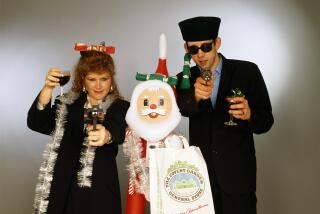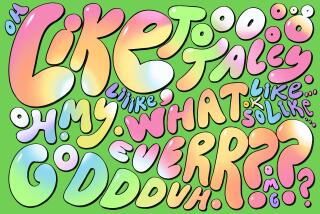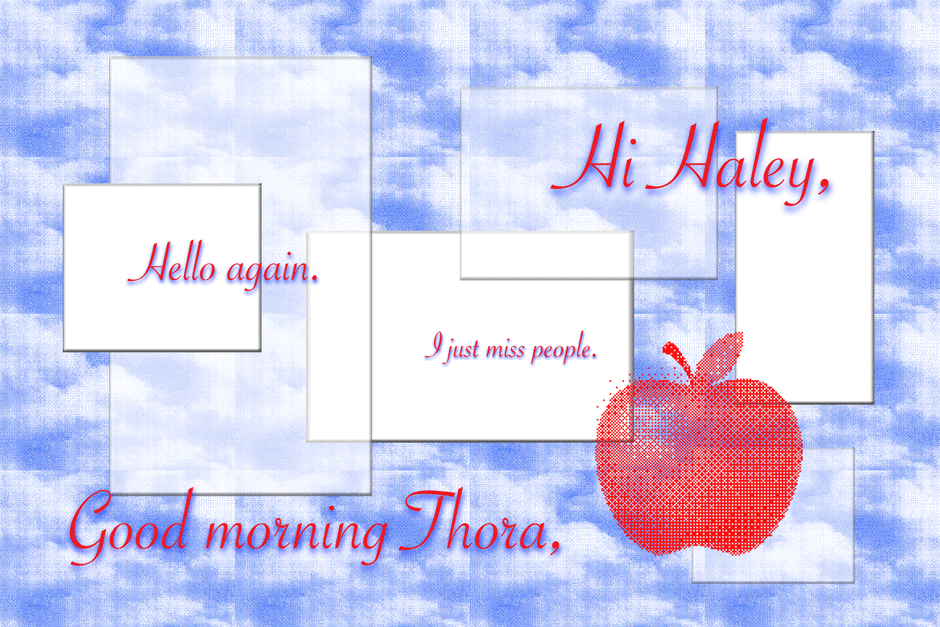Talk of the Town - When New Yorkers Say, ‘Just Ax,’ They Probably Don’t Mean ‘Just Chop Wood’
- Share via
WRITING recently about the pronunciation of cities’ names, I observed that New York rhymed with pork .
I was immediately corrected by a former New Yorker, if there is such a thing. New York , he advised me, rhymes with hawk.
Of course, New Yorkese is a language apart, spoken only by New Yorkers. Because New York is thought to be the source and magnet of all American culture, one might wonder if New Yorkese hasn’t emanated from Manhattan to corrupt American speech from coast to coast.
It hasn’t because New York is an involuted entity; despite its power (now threatened by Los Angeles) as the monetary center of the Western World, it does not export its manners and morals to the rest of the country.
American manners and morals are invented in Los Angeles and radiated to the rest of the civilized world. Soon English everywhere will be spoken in the homogenized California accent of television and the movies. New Yorkese is doomed to be spoken only in New York City, and New Yorkers will thus become more and more isolated from the rest of the republic.
In vain, New York’s chauvinistic mayor, Ed Koch, periodically fulminates against the corruption of New York’s schoolchildren by New Yorkese and personally conducts classes in correct pronunciation. The mayor is especially irritated by the use of ax for ask or asked , as in “Don’t ax.”
For many years, travelers have been able to prepare themselves for visits to other nations with English-foreign dictionaries. They were helpless, however, when deposited by air into the foreign land of New York.
Now Judy Levine and Nancy Johnson have filled that need with “How to Speak New Yorkese” (Spectacle Lane Press), which they call “A Handy Guide to the World’s Most Improbable Language.”
This little book can fit into a purse or coat pocket. And it may help outlanders make sense of the conversation of cabdrivers, waiters, policemen, salesclerks and any other New Yorkers they encounter on the street or in restaurants or on the subway.
Under A , for example, we find the mayor’s bugaboo itself: “Ax. To make inquiry: ‘What if I don’t know how ta find Penn Station?’ No problem. Just ax someone.”
Bean is defined as a creature. “I’m continually searchin’ the sky for UFOs cause I’d love ta meet an alien bean.” Boat is an adjective meaning a pair of: “That kid’s gonna go far. He’s got a good head on his shoulders and boat feet on the ground.”
In New Yorkese, a Catholic is a Catlick , and an intersection is a cawna ; an indefinite amount is a cupala .
Fahgedit means to put it out of your mind. “So I dented your car a little. What’s the big deal? Fahgedit .” (Actually, if my ear for New Yorkese is correct, that should be: “So I dented ya caw a liddle. Wha sa big deal? Fahgedit .”
Huh is a feminine pronoun: her . Huz is the possessive: “Was that sable coat really huz ?” Hizzonuh is a term of respect: “ Hizzonuh the mayuh has a way with woids.” Shouldn’t that be “wit woids ?”
Huzbin is a woman’s mate; inlores are one’s mate’s relatives. A jewla is someone who deals in precious stones. Joisy is a small state built specifically for a classic view of the New York skyline. Lawn Guyland : an island southeast of Manhattan.
A lieberry is a place with a lot of books. A looza is a person doomed to fail. Owaze : the opposite of never. Paw : opposite of rich. Pawk Avenya : a hoity-toity address.
New Yorkese, the authors say, requires the slurring of words and the elimination of as many syllables as possible. “In New York, time cannot be wasted on precision of speech.”
I noticed several words in their dictionary that sounded like standard American speech to me. Don’t we all pronounce coffee as cawfee ; exhausted as eggzawsted ; chocolate as chawklit ? And how else would we say off, as in off-Broadway, except awf ?
And isn’t a clotheshorse (a woman who loves clothes to excess) a close horse in Los Angeles as well as in New York?
More to Read
Sign up for Essential California
The most important California stories and recommendations in your inbox every morning.
You may occasionally receive promotional content from the Los Angeles Times.













